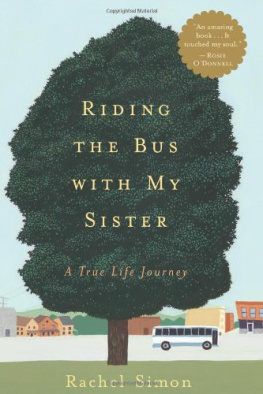Rachel Simon - The Story of Beautiful Girl
Here you can read online Rachel Simon - The Story of Beautiful Girl full text of the book (entire story) in english for free. Download pdf and epub, get meaning, cover and reviews about this ebook. year: 2011, publisher: Grand Central Publishing, genre: Detective and thriller. Description of the work, (preface) as well as reviews are available. Best literature library LitArk.com created for fans of good reading and offers a wide selection of genres:
Romance novel
Science fiction
Adventure
Detective
Science
History
Home and family
Prose
Art
Politics
Computer
Non-fiction
Religion
Business
Children
Humor
Choose a favorite category and find really read worthwhile books. Enjoy immersion in the world of imagination, feel the emotions of the characters or learn something new for yourself, make an fascinating discovery.
- Book:The Story of Beautiful Girl
- Author:
- Publisher:Grand Central Publishing
- Genre:
- Year:2011
- Rating:4 / 5
- Favourites:Add to favourites
- Your mark:
- 80
- 1
- 2
- 3
- 4
- 5
The Story of Beautiful Girl: summary, description and annotation
We offer to read an annotation, description, summary or preface (depends on what the author of the book "The Story of Beautiful Girl" wrote himself). If you haven't found the necessary information about the book — write in the comments, we will try to find it.
The Story of Beautiful Girl — read online for free the complete book (whole text) full work
Below is the text of the book, divided by pages. System saving the place of the last page read, allows you to conveniently read the book "The Story of Beautiful Girl" online for free, without having to search again every time where you left off. Put a bookmark, and you can go to the page where you finished reading at any time.
Font size:
Interval:
Bookmark:
RACHEL SIMON

NEW YORK BOSTON

For those who were put away
Telling our stories is holy work.
The Reverend Nancy Lane, Ph.D.
1968
A t the end of the night that would change everything, the widow stood on her porch and watched as the young woman was marched down her front drive and shoved into the sedan. The girl did not fight back, bound and tied as she was, nor did she cry out into the chill autumn rain, so surely the doctor and his attendants thought they had won. They did not know, as the car doors slammed shut, the engine came on, and the driver steered them down the muddy hill toward the road, that the widow and the girl in the backseat had just defied them right under their noses. The widow waited until the taillights reached the bottom of the drive, then turned and entered her house. And as she stood at the foot of the staircase, hoping theyd show mercy to the young woman and worrying about the whereabouts of the runaway man, the widow heard the sound the doctor hadnt been seeking. It was the sound that would always connect her to the girl and forever make her remember the man. It was the sweet, deep breaths of a hidden person. A sleeping stranger. A baby.
That November day had seemed as ordinary as any in the widows seventy years. The mail carrier had delivered letters, birds had flown south across her fields, and storm clouds had wheeled across the Pennsylvania sky. The farm animals were fed; the dishes were used and washed; new letters were placed in the roadside mailbox. Dusk fell. The widow lit the logs in the fireplace and settled into her reading chair. Then, perhaps thirty pages later, the clouds cracked open, releasing a deluge that made such a din that she peered over her tortoiseshell glasses toward the living room window. To her surprise, the rain cascaded so heavily, the glass looked opaque. After half a century on this farm, shed seen no sights like this before; she would mention it in her letters tomorrow. Drawing the lamp closer, she lowered her eyes to her book.
For many hours, she shut out the din and concentrated on the pagea biography of Dr. Martin Luther King Jr., gone just a few months from this lifebut then became aware of a knocking on her door. She turned. Soon after their wedding day, when her husband was building onto the original one-room house to make room for a wife, she realized hed never remarked on the view, with its sweeping fields, dense woods, and distant mountains, all watched over by the colorful vault of the sky. He lived here simply because the farm had been in his family and was thirty rolling miles, an hours drive, and a county line away from the closest town, Wells Bottom, where she was a schoolteacher. As shed watched the walls go up, she noticed how few windows hed included, and how small each was, and understood shed have to be satisfied with meager portions of the landscape. The front door, for instance, was all wood and no glass, with only a single window set in the wall to its left. But tonights storm obscured even that limited view. So the widow crossed the living room and turned the knob on the door.
She thought, at first, that there were two of them. A man and a woman. From under the roof of the porch, the man, a Negro, looked at her with startled eyes, as if unaware that the door upon which hed been knocking had just pulled back. The woman beside him did not look up. Her skin was pale, and she was biting her lip. Her face was bone-bare, with shadows in every rise and dip. Was the woman as lean as she seemed? It was impossible to tell; she was covered in a gray blanket. No, several blankets. Wool, like bedding issued in the war, draped into layers of hoods and capes. The mans arm lay protectively around the womans shoulders.
The widow turned back to the man. He too wore coverings, but they were not the same as the womans. USED CARS , read one. OPEN TILL NINE , read another. The widow recognized them as large signs from businesses in Wells Bottom. Water was pouring off them, as it was from the sodden wool; her porch was now a puddle.
Dread squeezed the widows chest. Five years into retirement, she was long past the time when she knew all the faces in Wells Bottom, and she did not know these. She should slam the door, call the police. Her husbands rifle was upstairs; was she agile enough to bound up to their bedroom? But the mans startled look was now melting toward desperation, and she knew they were running from something. The widows breath came out heavily. She wished she were not alone. Yet they were alone, too, and cold and frightened.
Who are you? the widow asked.
The woman slowly lifted her eyes. The widow caught the movement, but no sooner had she tilted her gaze upthe widow was slight, five feet one, and the woman before her was tall, though not as tall as the manthan the woman jerked her head back down.
Unlike the woman, the man had not acknowledged the widows voice. But he had noticed his companions quick gesture and retreat, and in response he gently rubbed her shoulder. It was a touch of tenderness, and even in the dim light that reached the porch from her reading lamp, the widow knew it was a look of caring. Yet she did not know that, in a trance of seeing what shed forgotten shed once felt herself, her face, too, revealed so much she was not saying.
The man looked back at the widow. A pleading came into his eyes, and he lifted his free hand. The widow flinched, thinking he was preparing to strike her. Instead he opened his fingers and flicked them toward the inside of the house, like a flipbook of a bird flying.
Thats when the widow realized the man could not hear.
Oh, she said, breath expelling her ignorance. Please come in.
She stepped aside. The man moved his hands in front of the woman. The woman nodded and clasped one of his hands, and they stepped over the threshold.
You must beare you?please, the widow mumbled, until, as she closed the door, her thin, schoolteacher voice finally settled on the proper statement: Lets get you out of those wet things. Immediately she thought herself foolish; the man could not hear, the woman was focused on the lamp, and anyway, their backs were to her. As one they crept across the living room, their makeshift raincoats dripping, but the widow couldnt bring herself to say anything. They appeared too relieved to be inside, mindful only of the closeness between them.
The man walked with muscular legs protruding from the oversize signs. His was evidently a body accustomed to labor, though why his legs were bare in November, the widow could not imagine. As for the woman, the blankets hung too low for a glimpse of anything aside from shoesshoes that seemed too large. The womans gait was uneven, her posture a slouch. Yellow curls wisped out from the woolen hood, and the widow thought, She is like a child.
The fire had gone low, and now the widow drew open the fireplace screen and added a log. Behind her she heard the woman grunt. She turned. The woman was gazing at the fire, and as the widow watched, the womans face filled with curiosity. The man tightened his arm around her shoulder.
There were only two chairs by the fire: her reading chair, with muslin covers over the worn armrests, and the wooden chair where her husband had read his sporting magazines and westerns. The sofa sat farther back. I should offer that, she thought. Before she could, they lowered themselves to the chairs.
Font size:
Interval:
Bookmark:
Similar books «The Story of Beautiful Girl»
Look at similar books to The Story of Beautiful Girl. We have selected literature similar in name and meaning in the hope of providing readers with more options to find new, interesting, not yet read works.
Discussion, reviews of the book The Story of Beautiful Girl and just readers' own opinions. Leave your comments, write what you think about the work, its meaning or the main characters. Specify what exactly you liked and what you didn't like, and why you think so.











